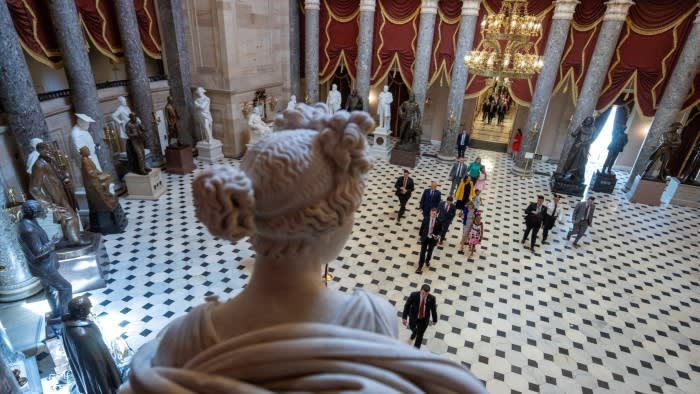Stay informed with free updates
Simply sign up to the War in Ukraine myFT Digest — delivered directly to your inbox.
Christine Lagarde, president of the European Central Bank, has poured cold water on US-backed proposals to use more than €260bn of frozen Russian assets to finance Ukraine’s war effort, warning they risked breaking international law.
Lagarde’s comments point to a transatlantic rift over the push to raise tens of billions of euros in debt for Ukraine secured against the future profits generated by the Russian state assets frozen by western countries.
Speaking at an event in Washington on Wednesday shortly before western finance ministers were due to discuss the latest proposals, Lagarde said they were raising serious concerns among lawyers — including in the US administration.
“I have seen four different schemes or proposals to circumvent what many other jurists or lawyers — including in some administrations in this country — regard as a very serious legal obstacle that can be construed as a violation of the legal international order.” She added that work was “ongoing” on the proposals.
“Moving from freezing the assets, to confiscating them, to disposing of them is something that needs to be looked at very carefully,” Lagarde said, warning it could entail “breaking the international order that you want to protect; that you would want Russia to respect”.
After the inconclusive debate, the G7 group of nations said in a statement on Wednesday evening: “We reaffirm our determination to ensure that Russia pays for the damage it has caused to Ukraine. Russia’s sovereign assets in our jurisdictions will remain immobilised until then, consistent with our respective legal systems.”
It added: “We will continue working on all possible avenues by which immobilised Russian sovereign assets could be made use of to support Ukraine, consistent with international law and our respective legal systems, with a view to update our leaders ahead of the Apulia Summit in June.”
The G7 has been split on what to do with €260bn worth of Russian assets put on hold by the west since Moscow launched its full-scale invasion of Ukraine in February 2022.
Washington has backed the idea of confiscating the reserves in their entirety and handing them to Ukraine, an idea European officials fear could violate international law and destabilise financial markets.
EU countries would prefer to only give Kyiv the profits generated by the underlying assets. But the issue of using Russian reserves to provide larger sums to Kyiv has become more urgent in recent months, with the war now in its third year and additional US aid to Ukraine held up in Congress.
UK chancellor Jeremy Hunt said on Wednesday that the US plan was a “really interesting idea” and that all proposals to tap the frozen assets needed to be examined with an open mind.
“The UK position has always been that everything needs to be within international law,” he said, adding that the UK had internal legal advice that there were ways of extracting value from the frozen assets that are consistent with international law.
Lagarde, a former lawyer, said there was “not a single doubt” about the principle that Russia should be made to pay for the reconstruction of Ukraine.
But she added that “precipitating the availability of it because financing is not available elsewhere — that opens a whole series of other questions” over respect of the international legal order, financial stability and joint liability.
The head of the ECB, which last year raised concerns about how confiscating the assets could effect international usage of the euro, said there was “a huge asymmetry” in the location of the assets, with only $6bn in the US and more than €200bn in the eurozone. She also pointed to the weaker position of the euro in international finance compared to the dollar.
EU economy commissioner Paolo Gentiloni, who was also in Washington for the Spring meetings of the IMF and World Bank, told the Financial Times the urgent matter for Ukraine right now was military support.
When it came to financial support, he said policymakers would “continue to explore other avenues” but that the EU should focus on the immediate task of agreeing existing proposals to release windfall profits related to the frozen Russian assets. This would permit further support by June which is “strongly needed” by the Ukrainians, adding €3bn to the EU’s €16bn commitment to Kyiv this year.
Gintarė Skaistė, Lithuanian finance minister, said in New York on Tuesday that rules could be changed to allow the Russian assets to be mobilised. “The legal system is created — it is not something coming from God — so we can find legally sound ways to have the result that would be beneficial for democratic countries [and] society and not have rules that help the aggressor.”
A senior US Treasury official said it would host discussions throughout the week as “leader of a global coalition that is working to deny Russia the weapons and money it needs to facilitate its unjust war . . . we expect these conversations to include ways to unlock the value of immobilised Russian sovereign assets to support Ukraine’s continued resistance and long-term reconstruction”. The official said the aim was to have “serious options on the table by the leaders summit in June”.
The White House did not immediately respond to a request for comment.
Read More: World News | Entertainment News | Celeb News
FT









